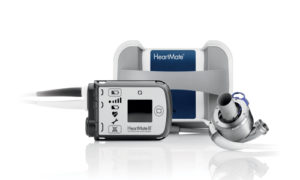
Abbott has announced new late-breaking data that show advanced heart failure patients living with its HeartMate 3 left ventricular assist device (LVAD) who did not receive aspirin experienced fewer complications from bleeding and were associated with reduced hospital visits compared to patients who took aspirin daily following their implant.
The data from the ARIES trial are the first to potentially shift how physicians manage their patients living with a HeartMate 3 heart pump, the company said in a press release. ARIES is an international, placebo-controlled, randomised clinical study to assess whether the absence of aspirin is safe and decreases bleeding in people with HeartMate 3.
The data were presented during a late-breaking presentation at the American Heart Association (AHA) 2023 Scientific Sessions (11–13 November, Philadelphia, USA) and simultaneously published in The Journal of the American Medical Association.
The ARIES trial studied more than 600 patients and found that HeartMate 3 patients who did not receive aspirin but continued using the standard post-implant vitamin-K antagonist (VKA) treatment regimen met the primary endpoint by showing non-inferiority of no aspirin to aspirin. The HeartMate 3 patients who did not take aspirin spent 47% fewer days in the hospital due to a nearly 40% decrease in bleeding events compared to patients who continued to take aspirin daily.
While the HeartMate 3 is associated with lower rates of complications compared to previous generation heart pumps, the company’s press release adds, bleeding remains a leading cause for rehospitalisations. The ARIES trial demonstrated a reduction in bleeding events in patients without aspirin, which could lead to an important change in management of patients with a HeartMate 3.
“The ARIES study moves the needle forward in improving the journey of advanced heart failure patients with a marked improvement in bleeding events, healthcare resource use and cost-savings by a simple decision to avoid the use of aspirin,” said Mandeep Mehra (Brigham and Women’s Hospital, Boston, USA). “The data are so compelling that the magnitude of benefit observed in avoiding aspirin is similar to the impact of introducing a new device to the market.”
In addition to finding reductions in bleeding and hospital visits for bleeding complications, the ARIES trial also revealed cost-savings for heart failure patients who did not take aspirin following implant of an Abbott HeartMate 3 LVAD. One year after receiving the device, there was a 41% reduction in estimated costs related to bleeding events. The data also found this same group had no elevated risk in developing thrombosis.
“There is a general consensus within the medical community that aspirin use should be a mandatory part of the treatment regimen for heart failure patients living with an LVAD; however, those assumptions were largely driven by observational data that have rarely been challenged,” said Robert Kormos, divisional vice president, global medical affairs, Abbott’s heart failure business. “The ARIES trial estimates that for every 100 people with the HeartMate 3, not taking aspirin prevents nearly 15 major bleeding events within their first year with the device. That equates to many more moments these patients can spend with their loved ones living a fuller life.”
The ARIES trial was an international, randomised study of either aspirin (100mg/day) or placebo with VKA therapy in advanced heart failure patients with Abbott’s HeartMate 3 LVAD.
The study (July 2020–September 2022) was conducted across 51 centres and included over 600 patients in the USA, Canada, the UK, France, Italy, Austria, Czech Republic, Kazakhstan and Australia.
ARIES met its primary endpoint which found that for patients with the HeartMate 3, an aspirin-free medication regimen is non-inferior to an anti-thrombotic regimen that includes aspirin.
The HeartMate 3 Left Ventricular Assist System (LVAS) is indicated for providing short- and long-term mechanical circulatory support (e.g., as bridge to transplant or myocardial recovery, or destination therapy) in adult and paediatric patients with advanced refractory left ventricular heart failure and with an appropriate body surface area. It is contraindicated for patients who cannot tolerate, or who are allergic to, anticoagulation therapy.












